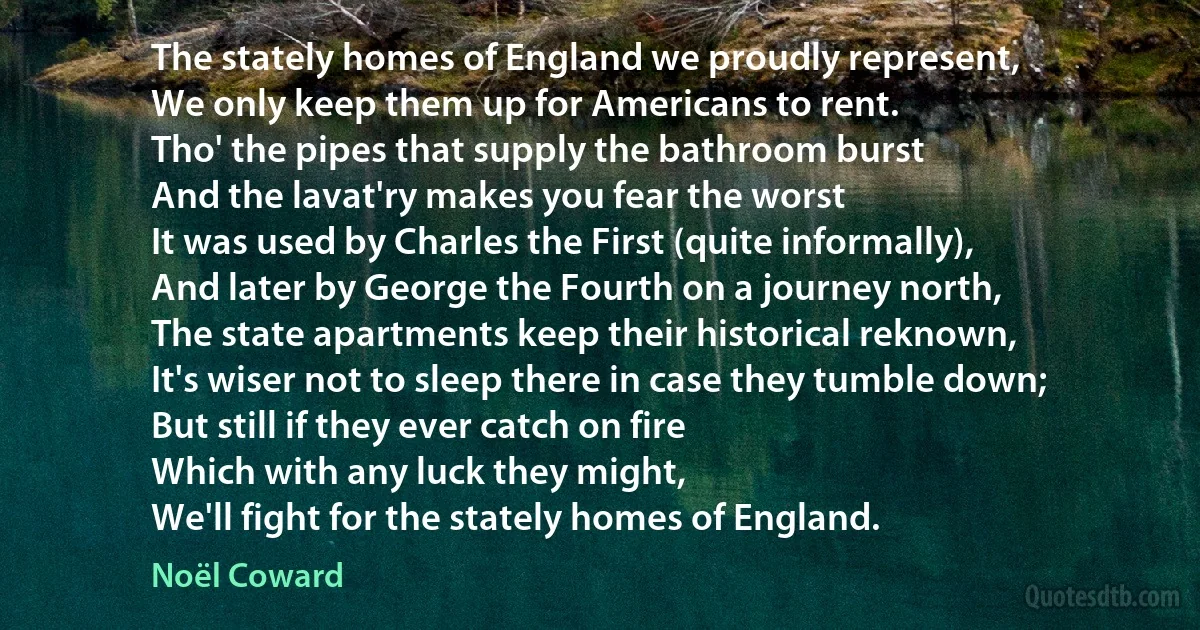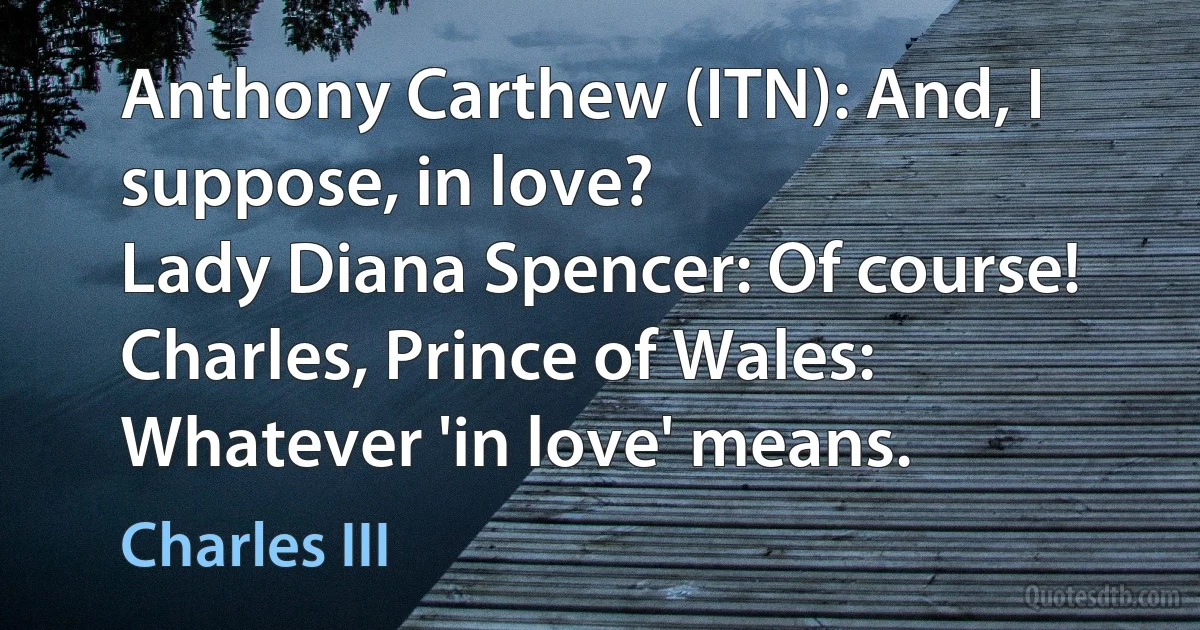Charles Quotes - page 4
I do not know anything about Charles Keating's work or his business or the matters you are dealing with. I only know he has been kind and generous to God's poor, and always ready to help whenever there was a need... Whenever someone asks me to speak to a judge, I always tell them to pray, to look into [their] heart, and to do what Jesus would do in that circumstance. And this is what I am asking of you, your Honor.

Mother Teresa
I'm asking you to do an unpleasant thing for a decent motive. You don't want to do it, and I understand how you feel, but I'm trying to get you to see that your personal moral code isn't always the highest factor. In wartime, a soldier shoots to kill because the universe imposes that situation on him. It may be an unjust war, and that might be his brother in the ship he's aiming at, but the war is real and he has his role.”
"Where's the room for free will in this mechanical universe of yours, Charles?”
"There isn't any. That's why I say the universe stinks.”
"We have no freedom at all?”
"The freedom to wriggle a little on the hook.”
"Have you felt this way all your life?”
"Most of it,” Boardman said.
"When you were my age?

Robert Silverberg
If any person had told the Parliament which met in terror and perplexity after the crash of 1720 that in 1830 the wealth of England would surpass all their wildest dreams, that the annual revenue would equal the principal of that debt which they considered an intolerable burden, that for one man of £10,000 then living there would be five men of £50,000, that London would be twice as large and twice as populous, and that nevertheless the rate of mortality would have diminished to one half of what it then was, that the post-office would bring more into the exchequer than the excise and customs had brought in together under Charles II, that stage coaches would run from London to York in 24 hours, that men would be in the habit of sailing without wind, and would be beginning to ride without horses, our ancestors would have given as much credit to the prediction as they gave to Gulliver's Travels.

Thomas Babington Macaulay
The issues raised in the historic conflict between Charles I, resting his claim to govern Britain on the divine right of kings, and Parliament - representing, however imperfectly, a demand for the wider sharing of power - concerned the use and abuse of state power, the right of the governed to a say in their government, and the nature of political freedom. The Levellers grew out of this conflict. They represented the aspirations of working people who suffered under the persecution of kings, landowners and the priestly class, and they spoke for those who experienced the hardships of poverty and deprivation. They developed and campaigned, first with Cromwell and then against him, for a political and constitutional settlement of the civil war which would embody principles of political freedom, anticipating by a century and a half the ideas of the American and French revolutions.

Tony Benn
You don't know old Charles as I know him. He's got into a queer set, and there's no knowing what mischief he's up to. He's perfectly capable of starting a revolution in Armenia or somewhere merely to see how it feels like to be a revolutionary. That's the damned thing about the artistic temperament.

John Buchan
First of all, Theodore Roosevelt and Charles W. Fairbanks, candidates for President and Vice-President, respectively, deny the class struggle and this almost infallibly fixes their status as friends of capital and enemies of labor. They insist that they can serve both; but the fact is obvious that only one can be served and that one at the expense of the other. Mr. Roosevelt's whole political career proves it.

Eugene V. Debs
He [King Philip II of Spain] is the mightiest enemy that England ever had, mightier than his father, the emperor Charles, or any other monarch of Christendom was these many years. ... Her Majesty's special and most proper defence must be by ships. For ships of England, her Majesty is of her own proper ships so strong as the enemy shall not be able to land any power where her Majesty's navy shall be near to the enemy's navy. The ships of her subjects are also at this day both in number, in strength, in all captains and mariners, stronger than ever they were in memory of man.

William Cecil, 1st Baron Burghley
I thought that I was the only historian, that had at once neglected present power, interest, and authority, and the cry of popular prejudices; and as the subject was suited to every capacity, I expected proportional applause. But miserable was my disappointment: I was assailed by one cry of reproach, disapprobation, and even detestation; English, Scotch, and Irish, Whig and Tory, churchman and sectary, freethinker and religionist, patriot and courtier, united in their rage against the man, who had presumed to shed a generous tear for the fate of Charles I and the Earl of Strafford.

David Hume
No,” said the old man, deep under. "I don't remember anyone winning anywhere any time. War's never a winning thing, Charlie. You just lose all the time, and the one who loses last asks for terms. All I remember is a lot of losing and sadness and nothing good but the end of it. The end of it, Charles, that was a winning all to itself, having nothing to do with guns.

Ray Bradbury
I can see it must seem strange, but to me it was normality. Really, my memory of my childhood is that the sun always shone and I spent all my time playing in the park. Since then I've discovered that some of the great musicians I admire - Charles Ives, John Cage, even Bob Dylan - had quite unconventional childhoods.

Joanna MacGregor
Others ... are in the habit of teaching that religion and philosophy are really the same thing. Such a statement, however, appears to be true only in the sense in which Francis I is supposed to have said in a very conciliatory tone with reference to Charles V: ‘what my brother Charles wants is also what I want', namely Milan. Others again do not stand on such ceremony, but talk bluntly of a Christian philosophy, which is much the same as if we were to speak of a Christian arithmetic, and this would be stretching a point. Moreover, epithets taken from such dogmas are obviously unbecoming of philosophy, for it is devoted to the attempt of the faculty of reason to solve by its own means and independently of all authority the problem of existence.

Arthur Schopenhauer
Jonathan Dimbleby: Understandably, when your marriage collapsed, you form close friendships, you re-establish close friendships, of whatever character that friendship is. Were you, did you try to be, faithful and honourable to your wife when you took on the vow of marriage?
Charles, Prince of Wales: Yes, absolutely.
Dimbleby: And you were?
Charles: Yes, until it became irretrievably broken down, us both having tried.

Charles III
The happiest screen collaboration of Elsa Lanchester and Charles Laughton - they're both wonderful - is in this adaptation of a Somerset Maugham story, "The Vessel of Wrath." It's set on an island in the Pacific, which Maugham calls Baru, and it's concerned with the efforts of the prim missionary (Lanchester) to reform the carnal, ribald beachcomber (Laughton). The situation is the reverse of that in Maugham's Sadie Thompson story, but with a light, comic tone. The Hepburn-Bogart "African Queen" probably took a few notions from it.

Pauline Kael
Charles Laughton is superbly vulgar in this whack at the backside of Victorianism. He makes a great vaudeville turn out of the role of an egocentric scoundrel, the prosperous bootmaker who doesn't want to part with his three marriageable daughters because they are too useful as unpaid labor. As the oldest daughter, the spinster in spite of herself, Brenda de Banzie is so "right" that when she marries her father's best workman and puts belching, drunken old Dad out of business, one feels the good old-fashioned impulse to applaud.

Pauline Kael

![The purity of the spectral element being the keystone of my.. ..searching for an optical formula on this basis ever, since I held a brush 1876 - 1884.. ..having read Charles Blanc in school and therefore knowing Chevreul's laws and Eugene Delacroix's precepts, having read the studies by the same Charles Blanc on the same painter [= Delacroix]. (Georges Seurat)](https://cdn.quotesdtb.com/img/quotes_images_webp/54/georges-seurat-basis-brush-429954.webp)

